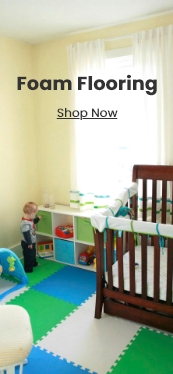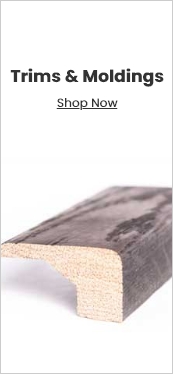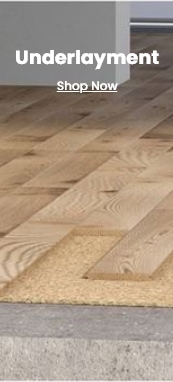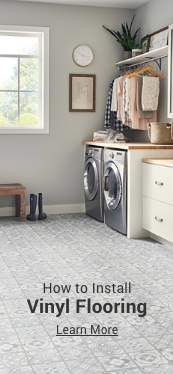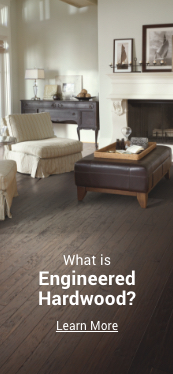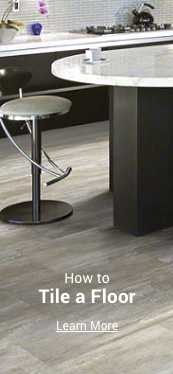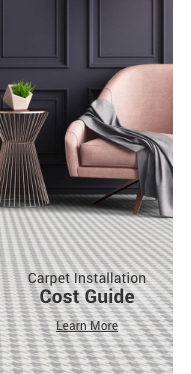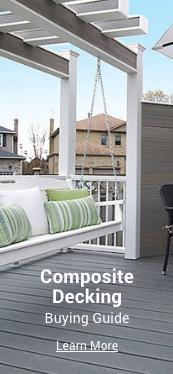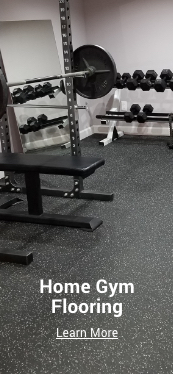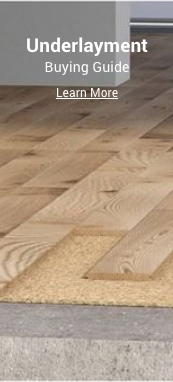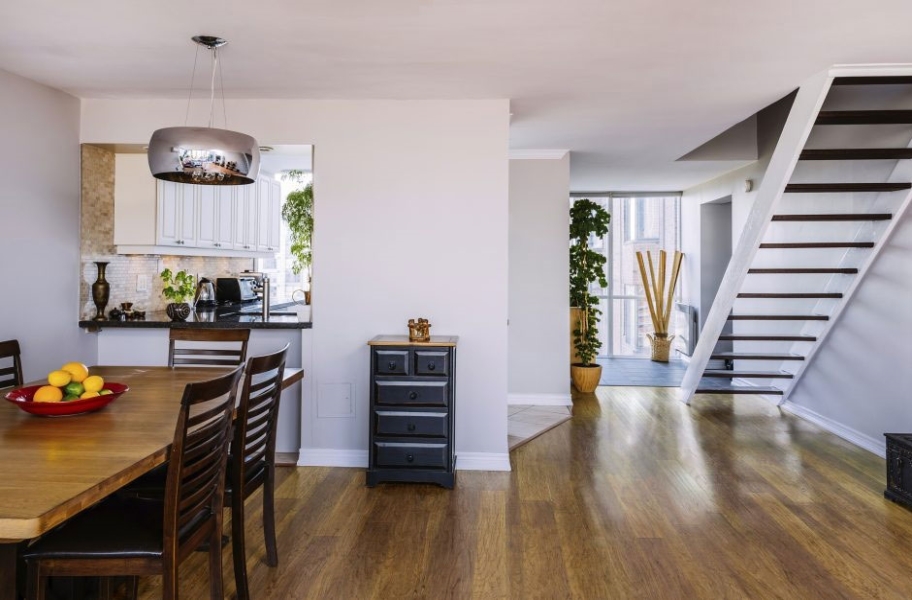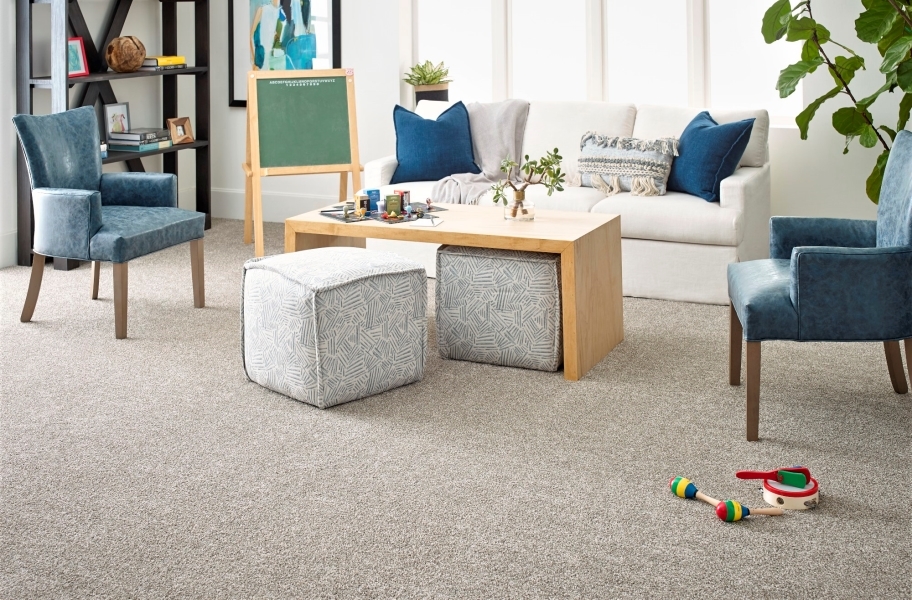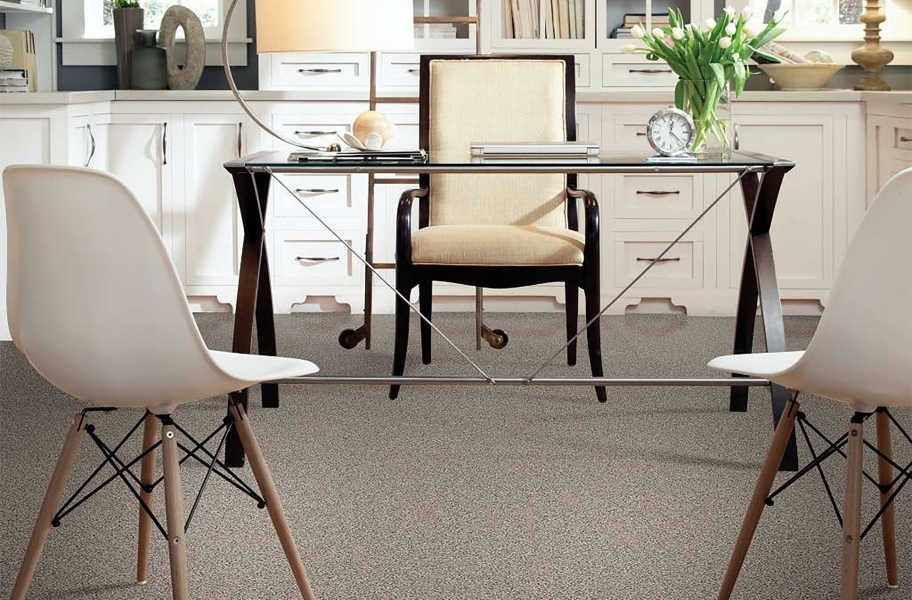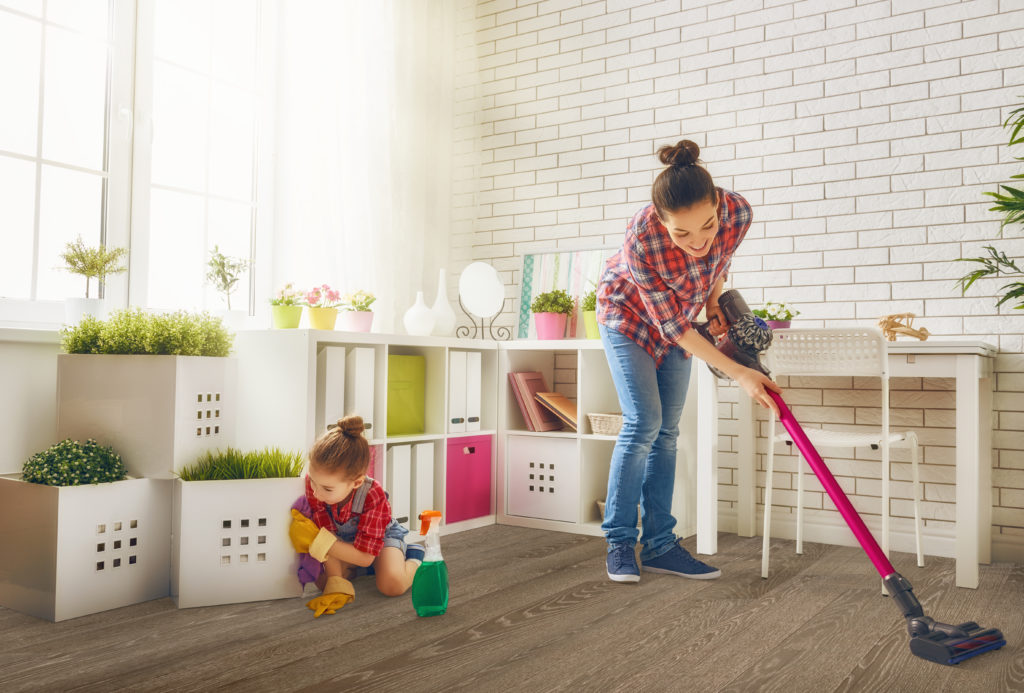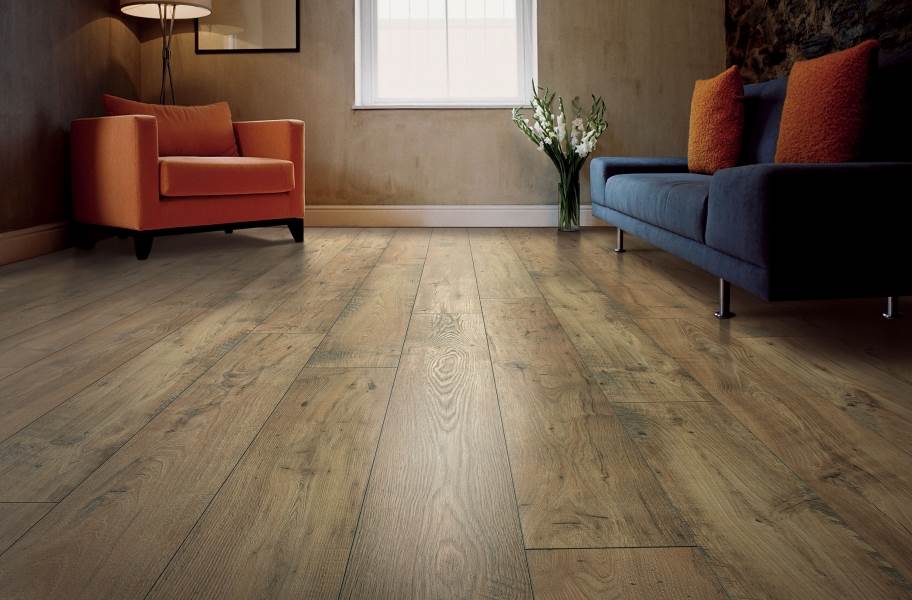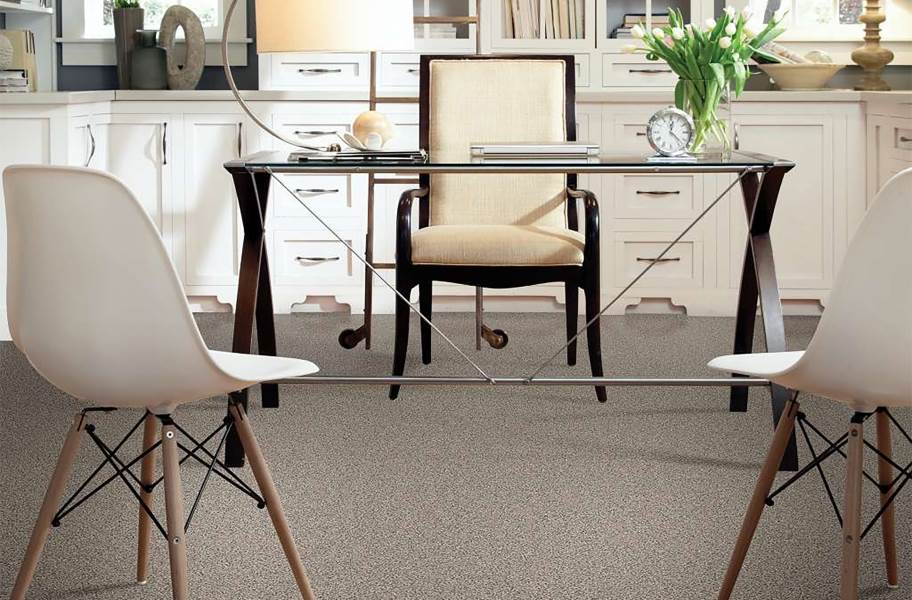5 Best Low-Voc Flooring Options for a Healthier Home
By Ciana Gitre
| Fact Checked By: Ashley De Zeeuw
Published: August 4, 2021 | Updated: September 23, 2022
In recent years, there has been a significant push for low-VOC flooring. Volatile organic compounds (VOCs) are toxic chemicals that emit “off-gas.” Extensive VOC exposure can eventually impact you and the health of your loved ones, including pets.
VOCs can be found in unsuspecting products you use and buy for your daily life at home, like flooring. Understanding what to look for while shopping for your personal space or business is essential. Now, let’s help you create a healthy home from the ground up. Literally.
| Related Content >> What Are VOCs in Floors? A Guide to Non-Toxic Flooring |
Low-VOC Laminate Flooring
Almost all of our flooring is either FloorScore or GreenGuard Certified. EPA guidelines have ensured that many floor options, including our laminates, are made of low-VOC materials. Flooring retailers and manufacturers are also taking the initiative to supply from sustainable lumber sources.
We care for your health, safety, and well-being, and it is a top priority regardless of the style or quality of flooring products you choose. If you are interested in our products but unsure of the VOC content, reach us at https://www.flooringinc.com/contact.aspx. Our flooring experts are here to help!
Pros of Laminate:
- Extensive warranty: Many of our laminate flooring options have an extended warranty. This makes laminate an excellent, long-term investment for your home.
- Easy to clean: Being one of the best hassle-free flooring options to clean, all you need is a quick sweep or vacuum. No floor waxing is necessary to maintain pristine conditions.
- Installation: Snap-together laminate flooring eliminates the need for VOC-releasing glues.
Cons of Laminate:
- Water-resistance: Traditional laminate is made with more natural materials than other wood-look flooring and can be susceptible to moisture. For increased resiliency in your home, check out our water-resistant and waterproof laminate options on our site.
Our Recommended Low-VOC Laminate Flooring:
| Related Content >> Laminate Flooring Buying Guide |
Low-VOC Engineered Hardwood Flooring
Engineered hardwood flooring is a modern version of the classic, solid wood flooring. The engineered hardwood planks’ layered construction comes with a moisture-resistant core and a thick veneer of real hardwood. If you are looking for real hardwood flooring with the benefits of modern engineering, this is for you.
Engineered wood has all the benefits of natural wood without harvesting large amounts from old-growth forests. Instead, the bulk of the plank is often made from faster-growing pine or even the remnants from the mills themselves. Production time is decreased and reduces greenhouse gas and air-polluting emissions.
Engineered wood flooring is also known for its ultra-durable engineered core. With both engineered and natural materials, engineered wood flooring has significant advantages you won’t find with natural wood. For another alternative eco-friendly choice, bamboo flooring offers similar hardwood looks.
Pros of Engineered Wood:
- Eco-friendly: For eco-conscious buyers, engineered wood is an excellent alternative to solid hardwood.
- Unique look: Every plank of engineered hardwood has a natural wood veneer. Repeating planks or unconvincing textures will never be an issue with engineered wood.
- Installation: Don’t know where you can place your engineered wood flooring? Each plank is made with modern construction that you can’t find with solid hardwood. You can install many of our engineered hardwoods in kitchens, bedrooms, laundry rooms, and more.
Cons of Engineered Wood:
- Maintenance: Like genuine hardwood, engineered wood flooring will take more care to keep its luster and shine.
- Investment: Engineered hardwood floors are a larger investment than almost any other flooring. These costs are often offset by increased home value, as engineered wood is a premium flooring option.
- Less DIY-friendly options: Traditionally, people have installed engineered hardwood flooring with the glue down and nail-down method. Today, a wider variety of engineered hardwood flooring offers the effortless click-and-lock method – perfect for first-time homeowners and DIYers.
Our Recommended Low-VOC Engineered Hardwood Flooring:
- Shaw Reflections Ash Engineered Wood
- Mannington Park City Oak Engineered Wood
- Italia Engineered Wood
| Related Content >> Engineered Hardwood Buying Guide |
Low-VOC Carpet Flooring
Carpet is a durable, easy to clean, and attractive way to make your home cozy. It’s easy to switch your style up with either broadloom carpet (also known as carpet rolls) or carpet tiles.
Carpet flooring has come a long way in regards to VOCs. In the past, it was common for carpet dye and the glue that binds carpet materials together to contain VOCs. Today, most carpet is CRI Green Label Plus Certified, meaning it’s safe from harmful chemicals and leaves no odd smell behind in your home.
For VOC-free carpet, our selection of Mohawk Air.o carpets come with many benefits. For those concerned about allergens, this collection is 100% odor and latex-free. Better yet, it won’t buckle or delaminate. Mohawk Air.o products are inherently stain-resistant, made of polyester fibers, and backed with a premium felt pad.
Shop All Air Quality Certified Carpet Products
Pros of Carpet Flooring:
- Comfort: Carpet flooring is one of the most comfortable surfaces to sit, work, and play on. Plus, it provides additional warmth underfoot that’s great during the winter months.
- Stain-resistant: Many modern-day carpets come with stain-resistant and waterproofing benefits that beat everyday soils and stains better than ever before.
Cons of Carpet Flooring:
- Maintenance: Depending on people’s space and lifestyles, you may find it needs frequent upkeep. Oils and allergens can seep into the carpet, so that you may use a vacuum more with this flooring option than others.
- Trends: Carpets can be more challenging to replace, so take your time finding the right timeless piece for your home. With hard-surfaced flooring becoming more popular, this option may not increase home value in the long run.
Our Recommended Low-VOC Flooring:
| Related Content >> Carpet FAQ |
Low-VOC Tile Flooring
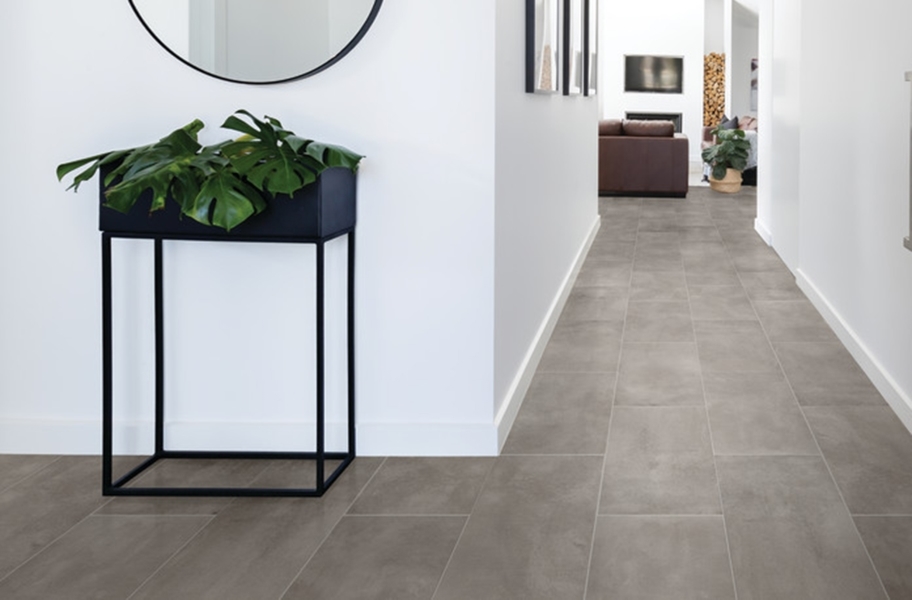
Generally, floor tiles are one of the cleanest and safest flooring options for homes. Manufacturers make tiles from clay, finely-ground sand, and feldspar and fire them in a kiln.
However, with a glaze applied, all tiles can become increasingly toxic. Whenever shopping, consider the lead and resin content in your tile’s glazes and look for either non-toxic glaze or the FloorScore label. If you use tiles that are considerably high in VOC content, you can also purchase low-VOC refinishing glazes that help combat the prior emissions.
Before your tile installation, consider the labels for your mortar and grout. Many VOCs can be in these items, just like concrete and epoxy. While searching for low-VOC options, you will find ceramic tile and porcelain tile stylish and durable eco-friendly flooring options. Additionally, these tiles won’t carry mold that reduces air quality.
Pros of Floor Tile:
- Durability: Floor tile can resist all sorts of scratches and dents. With excellent maintenance, your tile’s lifetime can last for decades.
- Style: You don’t have to sacrifice great-looking floors for non-toxic flooring. Tile flooring comes in endless variations of designs, styles, and sizes.
Cons of Floor Tile:
- Price: The tile price range begins with the material, whether porcelain, ceramic, or natural stone. Additionally, many tile options require a skilled tradesperson to install.
- Comfort: Some homeowners may find floor tile to be a less comfortable option than options like carpet. However, it’s all personal preference.
| Related Content >> How to Clean Tile Floors |
Low-VOC Vinyl Flooring
Due to the high contents of lead, cadmium, and VOCs in the past manufactured vinyl, there is still a negative outlook on vinyl flooring. Vinyl is a petroleum-based product made from polyvinyl chloride (PVC), which can off-gas VOCs for years.
With increased regulations and advanced VOC testing, the popular vinyl flooring choice is now safer than ever. Many companies take it upon themselves to get FloorScore tested for their vinyl products.
Counterfeit items also play a part in vinyl’s bad reputation. Many non-domestic retailers have been investigated for selling items that have undergone no VOC regulations or quality control. The best way to prevent yourself from being a victim of purchasing toxic flooring is to buy directly from a U.S. manufacturer or through their partners.
For safe, long-lasting vinyl flooring for your home, the TritonCore Pro 7″ Rigid Core Vinyl Planks is a customer favorite. It’s one of the best budget-friendly SPC vinyl on the market and has various real-wood looks to choose from. Waterproof, stain and scratch-resistant, easy to DIY, and FloorScore Certified, TritonCore Pro has all the bells and whistles you could want.
Pros of Vinyl Flooring:
- Easy to maintain: Vinyl flooring is one of the most low-maintenance options to keep up with! For regular maintenance, a quick sweep or vacuum will keep your floors looking neat. For a deeper clean, use a damp mop and mild solution to achieve a polished appearance.
- Water resistance: Not only is vinyl known for its durability, but it comes in a wide variety of water-resistant and 100% waterproof options.
- Aesthetics: Vinyl visually compares to more expensive options like hardwood and engineered hardwood. Vinyl also offers a few looks that others don’t, like stone and decorative looks.
Cons of Vinyl Flooring:
- Repair: Depending on the manufacturer’s instructions, your vinyl flooring may offer a loose lay and glue-down installation. If you use a glue-down method, repairing the vinyl planks may be slightly trickier to do.
- Dent-resistant: Compared to laminate, vinyl flooring tends to be more susceptible to denting and scratches.
Our Recommended Low-VOC Vinyl Flooring:
- COREtec Pro Plus 7” Rigid Core Vinyl Planks
- Adura Max Apex 16” Waterproof Vinyl Planks
- Shaw Pantheon HD Plus Waterproof Vinyl Planks
| Related Content >> Vinyl Plank Flooring Buying Guide |
Low-VOC Underlay, Adhesives, and Finishes
The amount of VOCs a product emits starts with the types and amounts of toxic chemicals used in the manufacturing process.
While underlayments offer various functions, like cushioning, leveling, soundproofing, and moisture resistance, you can’t overlook the material itself. Cork or low-VOC rubber underlayments mitigate any flooring issues you may have while working to keep your indoor air quality great.
One of the most neglected sources of VOCs is within building materials used for flooring installation. If you plan on using adhesive or glue, look for natural brands or VOC-compliant products.
For floor lacquers, consider oil-based sealers for your healthy flooring. Many consumers don’t realize that this maintenance step can cause more damage than good.
Healthy Alternatives for Floor Cleaner
If you’ve made it this far, we know that safety is a top priority for you! So now that you’re an expert on the flooring end, we’ve got some fresh and safe ways to clean it.
Check out What is the Best Homemade Floor Cleaner? 10+ DIY Ideas for practical water-based solutions that won’t break the bank either.
Conclusion
We hope this healthy flooring guide has helped you have reassurance in your wellbeing at home. Remember, to get the best air quality, look for phthalate-free products, and flooring materials with zero or low VOC ratings. Ready to start shopping?
ORDER FREE SAMPLES SHOP ALL FLOORING









